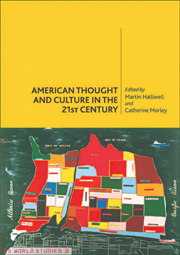Book contents
- Frontmatter
- Contents
- Acknowledgements
- Notes on the Contributors
- Introduction: The Next American Century?
- PART 1 POLITICS
- 1 American Politics in the 1990s and 2000s
- 2 American Leadership into the New Century
- 3 9/11 and US Foreign Policy
- 4 Three Variations on American Liberalism
- 5 The Rise of Postmodern Conservatism
- 6 US Propaganda
- PART 2 SOCIETY
- PART 3 CULTURE
- Bibliography
- Index
4 - Three Variations on American Liberalism
from PART 1 - POLITICS
Published online by Cambridge University Press: 05 August 2013
- Frontmatter
- Contents
- Acknowledgements
- Notes on the Contributors
- Introduction: The Next American Century?
- PART 1 POLITICS
- 1 American Politics in the 1990s and 2000s
- 2 American Leadership into the New Century
- 3 9/11 and US Foreign Policy
- 4 Three Variations on American Liberalism
- 5 The Rise of Postmodern Conservatism
- 6 US Propaganda
- PART 2 SOCIETY
- PART 3 CULTURE
- Bibliography
- Index
Summary
Liberalism in the United States refers to a politico-cultural persuasion that has advocates almost exclusively in the American Democratic Party. The word also describes a group of political theorists who ‘do’ philosophy, and who tend to complicate and defy mainstream American party identifications and labels because their concerns largely transcend them: a debate that pits theorists called ‘liberal’ against those called ‘communitarian’. Most books and articles written about liberalism in the United States in recent years consider political culture and strategy, which can appeal to most every liberal, especially those of the more partisan variety. Less frequent, knottier treatments take on philosophical or historical issues and tend to attract a much smaller, primarily academic readership. Sometimes the different approaches reach across audiences, but not very often. Nonetheless, for purposes of convenience, we might describe American liberalism at the start of the 21st century as a set of variations on a theme, the variations being (1) pragmatic/pluralist, (2) Rawlsian/rights-based and (3) polemical/radical.
A first, tradition-seeking liberal mode might be described as meliorist or pragmatic – or, to borrow a more expressive phrase from the philosopher William James, an ‘ever not quite’. A second, philosophical variation travels best under the terms of a Rawlsian debate, often concerned with what the political theorist John Rawls referred to as ‘public reason’, an idea that has inspired a vigorous transatlantic exchange ever since the appearance of Rawls's Theory of Justice in 1971.
- Type
- Chapter
- Information
- American Thought and Culture in the 21st Century , pp. 65 - 80Publisher: Edinburgh University PressPrint publication year: 2008

